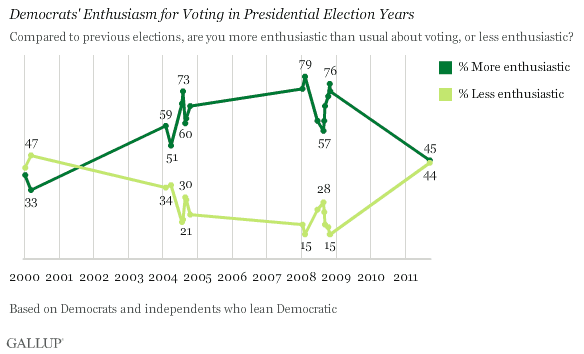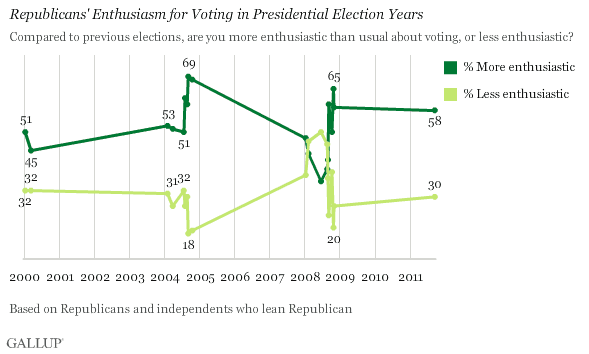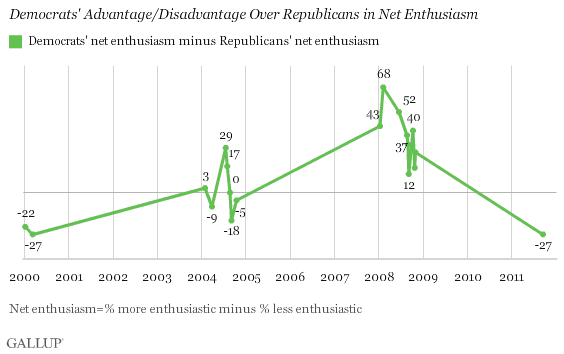PRINCETON, NJ -- In thinking about the 2012 presidential election, 45% of Democrats and independents who lean Democratic say they are more enthusiastic about voting than usual, while nearly as many, 44%, are less enthusiastic. This is in sharp contrast to 2008 and, to a lesser extent, 2004, when the great majority of Democrats expressed heightened enthusiasm about voting.

Democrats' muted response to voting in 2012 also contrasts with Republicans' eagerness. Nearly 6 in 10 Republicans, 58%, describe themselves as more enthusiastic about voting. That is nearly identical to Republicans' average level of enthusiasm in 2004 (59%) and higher than it was at most points in 2008.

The latest results are from a USA Today/Gallup poll conducted Sept. 15-18, nearly 14 months before the 2012 election is to be held. This is the earliest Gallup has asked Americans to rate their enthusiasm about voting in advance of a presidential election. All of the measures leading up to the 2000, 2004, and 2008 elections were conducted in the same calendar year, starting in January. Nevertheless, the robust level of Republican enthusiasm today suggests that Democrats' subdued enthusiasm is meaningful, rather than merely a reflection of the early timing.
Democrats' Relative Enthusiasm Is Lowest in a Decade
The difference between Democrats' enthusiasm and Republicans' enthusiasm can be summarized by plotting the difference in the two groups' net enthusiasm scores -- that is, the percentage of each group saying they are more enthusiastic minus the percentage less enthusiastic.
Democrats' net enthusiasm (+1) now trails Republicans' net enthusiasm (+28) by 27 percentage points. By contrast, Democrats held the advantage on net enthusiasm throughout 2008 -- on several occasions, by better than 40-point margins. Democrats occasionally trailed Republicans in net enthusiasm in 2004, but never by as much as is seen today. The current balance of enthusiasm among Republicans and Democrats is similar to what Gallup found in the first few months of 2000.

Among all Americans, 48% say they are more enthusiastic than usual about voting in 2012 and 40% are less enthusiastic. That 48% is significantly lower than the 65% more enthusiastic right before both the 2004 and 2008 presidential elections, owing largely to lower enthusiasm today among Democrats.
Bottom Line
Gallup's initial -- and early -- reading on Republicans' and Democrats' enthusiasm for 2012 indicates the emotional climate surrounding that election could be quite different from the climate in 2008, when Democrat Barack Obama won, partly owing to supermajority support from several groups. Democrats' current enthusiasm about voting is not only lower than it was in 2008, but lower than in 2004, when Republican George W. Bush won re-election.
While Gallup has not been able to establish a statistical link between heightened enthusiasm and greater turnout in past elections, the party with the enthusiasm advantage generally tends to fare better. Given that President Obama's job approval rating continues to hover around 40% and that he appears vulnerable in the general election, it is not surprising that Democrats are currently less enthusiastic than Republicans about voting in 2012. However, should this pattern continue well into next year, it could be an important indicator of which way the election will go.
Survey Methods
Results for this USA Today/Gallup poll are based on telephone interviews conducted Sept. 15-18, 2011, with a random sample of 1,004 adults, aged 18 and older, living in all 50 U.S. states and the District of Columbia.
For results based on the total sample of national adults, one can say with 95% confidence that the maximum margin of sampling error is ±4 percentage points.
For results based on the total sample of 439 Republicans/Republican leaners, one can say with 95% confidence that the maximum margin of sampling error is ±6 percentage points. For results based on the total sample of 454 Democrats/Democratic leaners, one can say with 95% confidence that the maximum margin of sampling error is ±6 percentage points.
Interviews are conducted with respondents on landline telephones and cellular phones, with interviews conducted in Spanish for respondents who are primarily Spanish-speaking. Each sample includes a minimum quota of 400 cell phone respondents and 600 landline respondents per 1,000 national adults, with additional minimum quotas among landline respondents by region. Landline telephone numbers are chosen at random among listed telephone numbers. Cell phone numbers are selected using random-digit-dial methods. Landline respondents are chosen at random within each household on the basis of which member had the most recent birthday.
Samples are weighted by gender, age, race, Hispanic ethnicity, education, region, adults in the household, and phone status (cell phone only/landline only/both, cell phone mostly, and having an unlisted landline number). Demographic weighting targets are based on the March 2010 Current Population Survey figures for the aged 18 and older non-institutionalized population living in U.S. telephone households. All reported margins of sampling error include the computed design effects for weighting and sample design.
In addition to sampling error, question wording and practical difficulties in conducting surveys can introduce error or bias into the findings of public opinion polls.
View methodology, full question results, and trend data.
For more details on Gallup's polling methodology, visit www.gallup.com.
